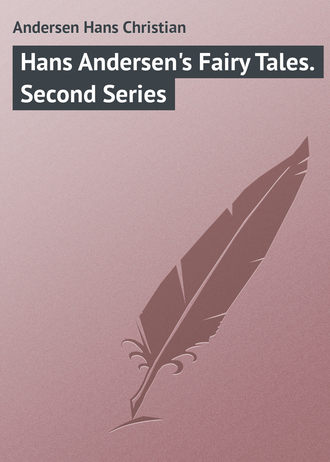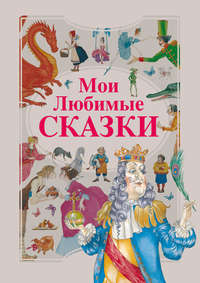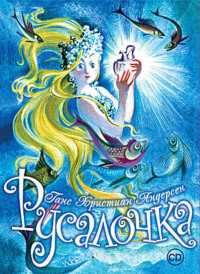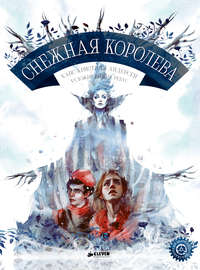 полная версия
полная версияHans Andersen's Fairy Tales. Second Series
So she passed quickly through the wood and the marsh and between the rushing whirlpools. She saw that in her father's palace the torches in the ballroom were extinguished and that all within were asleep. But she did not venture to go in to them, for now that she was dumb and going to leave them forever she felt as if her heart would break. She stole into the garden, took a flower from the flower bed of each of her sisters, kissed her hand towards the palace a thousand times, and then rose up through the dark-blue waters.
The sun had not risen when she came in sight of the prince's palace and approached the beautiful marble steps, but the moon shone clear and bright. Then the little mermaid drank the magic draft, and it seemed as if a two-edged sword went through her delicate body. She fell into a swoon and lay like one dead. When the sun rose and shone over the sea, she recovered and felt a sharp pain, but before her stood the handsome young prince.
He fixed his coal-black eyes upon her so earnestly that she cast down her own and then became aware that her fish's tail was gone and that she had as pretty a pair of white legs and tiny feet as any little maiden could have. But she had no clothes, so she wrapped herself in her long, thick hair. The prince asked her who she was and whence she came. She looked at him mildly and sorrowfully with her deep blue eyes, but could not speak. He took her by the hand and led her to the palace.
Every step she took was as the witch had said it would be; she felt as if she were treading upon the points of needles or sharp knives. She bore it willingly, however, and moved at the prince's side as lightly as a bubble, so that he and all who saw her wondered at her graceful, swaying movements. She was very soon arrayed in costly robes of silk and muslin and was the most beautiful creature in the palace; but she was dumb and could neither speak nor sing.
Beautiful female slaves, dressed in silk and gold, stepped forward and sang before the prince and his royal parents. One sang better than all the others, and the prince clapped his hands and smiled at her. This was a great sorrow to the little mermaid, for she knew how much more sweetly she herself once could sing, and she thought, "Oh, if he could only know that I have given away my voice forever, to be with him!"
The slaves next performed some pretty fairy-like dances, to the sound of beautiful music. Then the little mermaid raised her lovely white arms, stood on the tips of her toes, glided over the floor, and danced as no one yet had been able to dance. At each moment her beauty was more revealed, and her expressive eyes appealed more directly to the heart than the songs of the slaves. Every one was enchanted, especially the prince, who called her his little foundling. She danced again quite readily, to please him, though each time her foot touched the floor it seemed as if she trod on sharp knives.
The prince said she should remain with him always, and she was given permission to sleep at his door, on a velvet cushion. He had a page's dress made for her, that she might accompany him on horseback. They rode together through the sweet-scented woods, where the green boughs touched their shoulders, and the little birds sang among the fresh leaves. She climbed with him to the tops of high mountains, and although her tender feet bled so that even her steps were marked, she only smiled, and followed him till they could see the clouds beneath them like a flock of birds flying to distant lands. While at the prince's palace, and when all the household were asleep, she would go and sit on the broad marble steps, for it eased her burning feet to bathe them in the cold sea water. It was then that she thought of all those below in the deep.
Once during the night her sisters came up arm in arm, singing sorrowfully as they floated on the water. She beckoned to them, and they recognized her and told her how she had grieved them; after that, they came to the same place every night. Once she saw in the distance her old grandmother, who had not been to the surface of the sea for many years, and the old Sea King, her father, with his crown on his head. They stretched out their hands towards her, but did not venture so near the land as her sisters had.
As the days passed she loved the prince more dearly, and he loved her as one would love a little child. The thought never came to him to make her his wife. Yet unless he married her, she could not receive an immortal soul, and on the morning after his marriage with another, she would dissolve into the foam of the sea.
"Do you not love me the best of them all?" the eyes of the little mermaid seemed to say when he took her in his arms and kissed her fair forehead.
"Yes, you are dear to me," said the prince, "for you have the best heart and you are the most devoted to me. You are like a young maiden whom I once saw, but whom I shall never meet again. I was in a ship that was wrecked, and the waves cast me ashore near a holy temple where several young maidens performed the service. The youngest of them found me on the shore and saved my life. I saw her but twice, and she is the only one in the world whom I could love. But you are like her, and you have almost driven her image from my mind. She belongs to the holy temple, and good fortune has sent you to me in her stead. We will never part.
"Ah, he knows not that it was I who saved his life," thought the little mermaid. "I carried him over the sea to the wood where the temple stands; I sat beneath the foam and watched till the human beings came to help him. I saw the pretty maiden that he loves better than he loves me." The mermaid sighed deeply, but she could not weep. "He says the maiden belongs to the holy temple, therefore she will never return to the world – they will meet no more. I am by his side and see him every day. I will take care of him, and love him, and give up my life for his sake."
Very soon it was said that the prince was to marry and that the beautiful daughter of a neighboring king would be his wife, for a fine ship was being fitted out. Although the prince gave out that he intended merely to pay a visit to the king, it was generally supposed that he went to court the princess. A great company were to go with him. The little mermaid smiled and shook her head. She knew the prince's thoughts better than any of the others.
"I must travel," he had said to her; "I must see this beautiful princess. My parents desire it, but they will not oblige me to bring her home as my bride. I cannot love her, because she is not like the beautiful maiden in the temple, whom you resemble. If I were forced to choose a bride, I would choose you, my dumb foundling, with those expressive eyes." Then he kissed her rosy mouth, played with her long, waving hair, and laid his head on her heart, while she dreamed of human happiness and an immortal soul.
"You are not afraid of the sea, my dumb child, are you?" he said, as they stood on the deck of the noble ship which was to carry them to the country of the neighboring king. Then he told her of storm and of calm, of strange fishes in the deep beneath them, and of what the divers had seen there. She smiled at his descriptions, for she knew better than any one what wonders were at the bottom of the sea.
In the moonlight night, when all on board were asleep except the man at the helm, she sat on deck, gazing down through the clear water. She thought she could distinguish her father's castle, and upon it her aged grandmother, with the silver crown on her head, looking through the rushing tide at the keel of the vessel. Then her sisters came up on the waves and gazed at her mournfully, wringing their white hands. She beckoned to them, and smiled, and wanted to tell them how happy and well off she was. But the cabin boy approached, and when her sisters dived down, he thought what he saw was only the foam of the sea.
The next morning the ship sailed into the harbor of a beautiful town belonging to the king whom the prince was going to visit. The church bells were ringing, and from the high towers sounded a flourish of trumpets. Soldiers, with flying colors and glittering bayonets, lined the roads through which they passed. Every day was a festival, balls and entertainments following one another. But the princess had not yet appeared. People said that she had been brought up and educated in a religious house, where she was learning every royal virtue.
At last she came. Then the little mermaid, who was anxious to see whether she was really beautiful, was obliged to admit that she had never seen a more perfect vision of beauty. Her skin was delicately fair, and beneath her long, dark eyelashes her laughing blue eyes shone with truth and purity.
"It was you," said the prince, "who saved my life when I lay as if dead on the beach," and he folded his blushing bride in his arms.
"Oh, I am too happy!" said he to the little mermaid; "my fondest hopes are now fulfilled. You will rejoice at my happiness, for your devotion to me is great and sincere."
The little mermaid kissed his hand and felt as if her heart were already broken. His wedding morning would bring death to her, and she would change into the foam of the sea.
All the church bells rang, and the heralds rode through the town proclaiming the betrothal. Perfumed oil was burned in costly silver lamps on every altar. The priests waved the censers, while the bride and the bridegroom joined their hands and received the blessing of the bishop. The little mermaid, dressed in silk and gold, held up the bride's train; but her ears heard nothing of the festive music, and her eyes saw not the holy ceremony. She thought of the night of death which was coming to her, and of all she had lost in the world.
On the same evening the bride and bridegroom went on board the ship. Cannons were roaring, flags waving, and in the center of the ship a costly tent of purple and gold had been erected. It contained elegant sleeping couches for the bridal pair during the night. The ship, under a favorable wind, with swelling sails, glided away smoothly and lightly over the calm sea.
When it grew dark, a number of colored lamps were lighted and the sailors danced merrily on the deck. The little mermaid could not help thinking of her first rising out of the sea, when she had seen similar joyful festivities, so she too joined in the dance, poised herself in the air as a swallow when he pursues his prey, and all present cheered her wonderingly. She had never danced so gracefully before. Her tender feet felt as if cut with sharp knives, but she cared not for the pain; a sharper pang had pierced her heart.
She knew this was the last evening she should ever see the prince for whom she had forsaken her kindred and her home. She had given up her beautiful voice and suffered unheard-of pain daily for him, while he knew nothing of it. This was the last evening that she should breathe the same air with him or gaze on the starry sky and the deep sea. An eternal night, without a thought or a dream, awaited her. She had no soul, and now could never win one.
All was joy and gaiety on the ship until long after midnight. She smiled and danced with the rest, while the thought of death was in her heart. The prince kissed his beautiful bride and she played with his raven hair till they went arm in arm to rest in the sumptuous tent. Then all became still on board the ship, and only the pilot, who stood at the helm, was awake. The little mermaid leaned her white arms on the edge of the vessel and looked towards the east for the first blush of morning – for that first ray of the dawn which was to be her death. She saw her sisters rising out of the flood. They were as pale as she, but their beautiful hair no longer waved in the wind; it had been cut off.
"We have given our hair to the witch," said they, "to obtain help for you, that you may not die to-night. She has given us a knife; see, it is very sharp. Before the sun rises you must plunge it into the heart of the prince. When the warm blood falls upon your feet they will grow together again into a fish's tail, and you will once more be a mermaid and can return to us to live out your three hundred years before you are changed into the salt sea foam. Haste, then; either he or you must die before sunrise. Our old grandmother mourns so for you that her white hair is falling, as ours fell under the witch's scissors. Kill the prince, and come back. Hasten! Do you not see the first red streaks in the sky? In a few minutes the sun will rise, and you must die."
Then they sighed deeply and mournfully, and sank beneath the waves.
The little mermaid drew back the crimson curtain of the tent and beheld the fair bride, whose head was resting on the prince's breast. She bent down and kissed his noble brow, then looked at the sky, on which the rosy dawn grew brighter and brighter. She glanced at the sharp knife and again fixed her eyes on the prince, who whispered the name of his bride in his dreams.
She was in his thoughts, and the knife trembled in the hand of the little mermaid – but she flung it far from her into the waves. The water turned red where it fell, and the drops that spurted up looked like blood. She cast one more lingering, half-fainting glance at the prince, then threw herself from the ship into the sea and felt her body dissolving into foam.
The sun rose above the waves, and his warm rays fell on the cold foam of the little mermaid, who did not feel as if she were dying. She saw the bright sun, and hundreds of transparent, beautiful creatures floating around her – she could see through them the white sails of the ships and the red clouds in the sky. Their speech was melodious, but could not be heard by mortal ears – just as their bodies could not be seen by mortal eyes. The little mermaid perceived that she had a body like theirs and that she continued to rise higher and higher out of the foam. "Where am I?" asked she, and her voice sounded ethereal, like the voices of those who were with her. No earthly music could imitate it.
"Among the daughters of the air," answered one of them. "A mermaid has not an immortal soul, nor can she obtain one unless she wins the love of a human being. On the will of another hangs her eternal destiny. But the daughters of the air, although they do not possess an immortal soul, can, by their good deeds, procure one for themselves. We fly to warm countries and cool the sultry air that destroys mankind with the pestilence. We carry the perfume of the flowers to spread health and restoration.
"After we have striven for three hundred years to do all the good in our power, we receive an immortal soul and take part in the happiness of mankind. You, poor little mermaid, have tried with your whole heart to do as we are doing. You have suffered and endured, and raised yourself to the spirit world by your good deeds, and now, by striving for three hundred years in the same way, you may obtain an immortal soul."
The little mermaid lifted her glorified eyes toward the sun and, for the first time, felt them filling with tears.
On the ship in which she had left the prince there were life and noise, and she saw him and his beautiful bride searching for her. Sorrowfully they gazed at the pearly foam, as if they knew she had thrown herself into the waves. Unseen she kissed the forehead of the bride and fanned the prince, and then mounted with the other children of the air to a rosy cloud that floated above.
"After three hundred years, thus shall we float into the kingdom of heaven," said she. "And we may even get there sooner," whispered one of her companions. "Unseen we can enter the houses of men where there are children, and for every day on which we find a good child that is the joy of his parents and deserves their love, our time of probation is shortened. The child does not know, when we fly through the room, that we smile with joy at his good conduct – for we can count one year less of our three hundred years. But when we see a naughty or a wicked child we shed tears of sorrow, and for every tear a day is added to our time of trial."
BUCKWHEAT
IF YOU should chance, after a tempest, to cross a field where buckwheat is growing, you may observe that it looks black and singed, as if a flame of fire had passed over it. And should you ask the reason, a farmer will tell you, "The lightning did that."
But how is it that the lightning did it?
I will tell you what the sparrow told me, and the sparrow heard it from an aged willow which stood – and still stands for that matter – close to the field of buckwheat.
This willow is tall and venerable, though old and crippled. Its trunk is split clear through the middle, and grass and blackberry tendrils creep out through the cleft. The tree bends forward, and its branches droop like long, green hair.
In the fields around the willow grew rye, wheat, and oats – beautiful oats that, when ripe, looked like little yellow canary birds sitting on a branch. The harvest had been blessed, and the fuller the ears of grain the lower they bowed their heads in reverent humility.
There was also a field of buckwheat lying just in front of the old willow. The buckwheat did not bow its head, like the rest of the grain, but stood erect in stiff-necked pride.
"I am quite as rich as the oats," it said; "and, moreover, I am much more sightly. My flowers are as pretty as apple blossoms. It is a treat to look at me and my companions. Old willow, do you know anything more beautiful than we?"
The willow nodded his head, as much as to say, "Indeed I do!" But the buckwheat was so puffed with pride that it only said: "The stupid tree! He is so old that grass is growing out of his body."
Now there came on a dreadful storm, and the flowers of the field folded their leaves or bent their heads as it passed over them. The buckwheat flower alone stood erect in all its pride.
"Bow your heads, as we do," called the flowers.
"There is no need for me to do that," answered the buckwheat.
"Bow your head as we do," said the grain. "The angel of storms comes flying hither. He has wings that reach from the clouds to the earth; he will smite you before you have time to beg for mercy."
"But I do not choose to bow down," said the buckwheat.
"Close your flowers and fold your leaves," said the old willow. "Do not look at the lightning when the cloud breaks. Even human beings dare not do that, for in the midst of the lightning one may look straight into God's heaven. The sight strikes human beings blind, so dazzling is it. What would not happen to us, mere plants of the field, who are so much humbler, if we should dare do so?"
"So much humbler! Indeed! If there is a chance, I shall look right into God's heaven." And in its pride and haughtiness it did so. The flashes of lightning were so awful that it seemed as if the whole world were in flames.
When the tempest was over, both the grain and the flowers, greatly refreshed by the rain, again stood erect in the pure, quiet air. But the buckwheat had been burned as black as a cinder by the lightning and stood in the field like a dead, useless weed.
The old willow waved his branches to and fro in the wind, and large drops of water fell from his green leaves, as if he were shedding tears. The sparrows asked: "Why are you weeping when all around seems blest? Do you not smell the sweet perfume of flowers and bushes? The sun shines, and the clouds have passed from the sky. Why do you weep, old tree?"
Then the willow told them of the buckwheat's stubborn pride and of the punishment which followed.
I, who tell this tale, heard it from the sparrows. They told it to me one evening when I had asked them for a story.
WHAT HAPPENED TO THE THISTLE
AROUND a lordly old mansion was a beautiful, well-kept garden, full of all kinds of rare trees and flowers. Guests always expressed their delight and admiration at the sight of its wonders. The people from far and near used to come on Sundays and holidays and ask permission to see it. Even whole schools made excursions for the sole purpose of seeing its beauties.
Near the fence that separated the garden from the meadow stood an immense thistle. It was an uncommonly large and fine thistle, with several branches spreading out just above the root, and altogether was so strong and full as to make it well worthy of the name "thistle bush."
No one ever noticed it, save the old donkey that pulled the milk cart for the dairymaids. He stood grazing in the meadow hard by and stretched his old neck to reach the thistle, saying: "You are beautiful! I should like to eat you!" But the tether was too short to allow him to reach the thistle, so he did not eat it.
There were guests at the Hall, fine, aristocratic relatives from town, and among them a young lady who had come from a long distance – all the way from Scotland. She was of old and noble family and rich in gold and lands – a bride well worth the winning, thought more than one young man to himself; yes, and their mothers thought so, too!
The young people amused themselves on the lawn, playing croquet and flitting about among the flowers, each young girl gathering a flower to put in the buttonhole of some one of the gentlemen.
The young Scotch lady looked about for a flower, but none of them seemed to please her, until, happening to glance over the fence, she espied the fine, large thistle bush, full of bluish-red, sturdy-looking flowers. She smiled as she saw it, and begged the son of the house to get one of them for her.
"That is Scotland's flower," she said; "it grows and blossoms in our coat of arms. Get that one yonder for me, please."
And he gathered the finest of the thistle flowers, though he pricked his fingers as much in doing so as if it had been growing on a wild rosebush.
She took the flower and put it in his buttonhole, which made him feel greatly honored. Each of the other young men would gladly have given up his graceful garden flower if he might have worn the one given by the delicate hands of the Scotch girl. As keenly as the son of the house felt the honor conferred upon him, the thistle felt even more highly honored. It seemed to feel dew and sunshine going through it.
"It seems I am of more consequence than I thought," it said to itself. "I ought by rights to stand inside and not outside the fence. One gets strangely placed in this world, but now I have at least one of my flowers over the fence – and not only there, but in a buttonhole!"
To each one of its buds as it opened, the thistle bush told this great event. And not many days had passed before it heard – not from the people who passed, nor yet from the twittering of little birds, but from the air, which gives out, far and wide, the sounds that it has treasured up from the shadiest walks of the beautiful garden and from the most secluded rooms at the Hall, where doors and windows are left open – that the young man who received the thistle flower from the hands of the Scottish maiden had received her heart and hand as well.
"That is my doing!" said the thistle, thinking of the flower she had given to the buttonhole. And every new flower that came was told of this wonderful event.
"Surely I shall now be taken and planted in the garden," thought the thistle. "Perhaps I shall be put into a flowerpot, for that is by far the most honorable position." It thought of this so long that it ended by saying to itself with the firm conviction of truth, "I shall be planted in a flowerpot!"
It promised every little bud that came that it also should be placed in a pot and perhaps have a place in a buttonhole – that being the highest position one could aspire to. But none of them got into a flowerpot, and still less into a gentleman's buttonhole.
They lived on light and air, and drank sunshine in the day and dew at night. They received visits from bee and hornet, who came to look for the honey in the flower, and who took the honey and left the flower.
"The good-for-nothing fellows," said the thistle bush. "I would pierce them if I could!"
The flowers drooped and faded, but new ones always came.
"You come as if you had been sent," said the thistle bush to them. "I am expecting every moment to be taken over the fence."
A couple of harmless daisies and a huge, thin plant of canary grass listened to this with the deepest respect, believing all they heard. The old donkey, that had to pull the milk cart, cast longing looks toward the blooming thistle and tried to reach it, but his tether was too short. And the thistle bush thought and thought, so much and so long, of the Scotch thistle – to whom it believed itself related – that at last it fancied it had come from Scotland and that its parents had grown into the Scottish arms.









